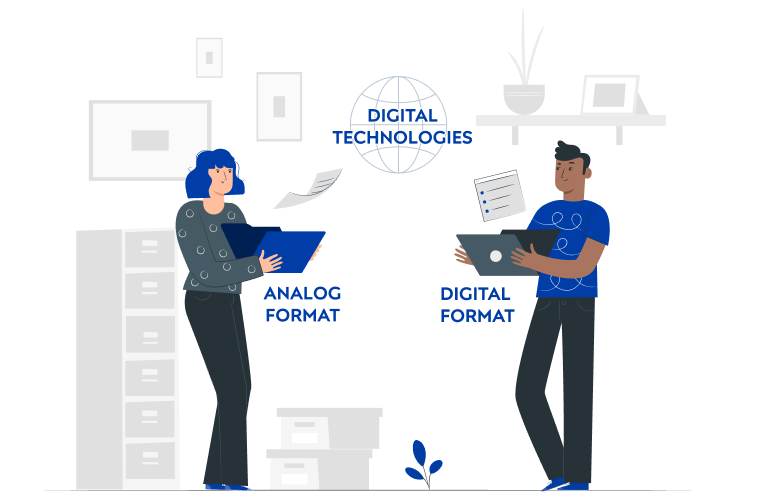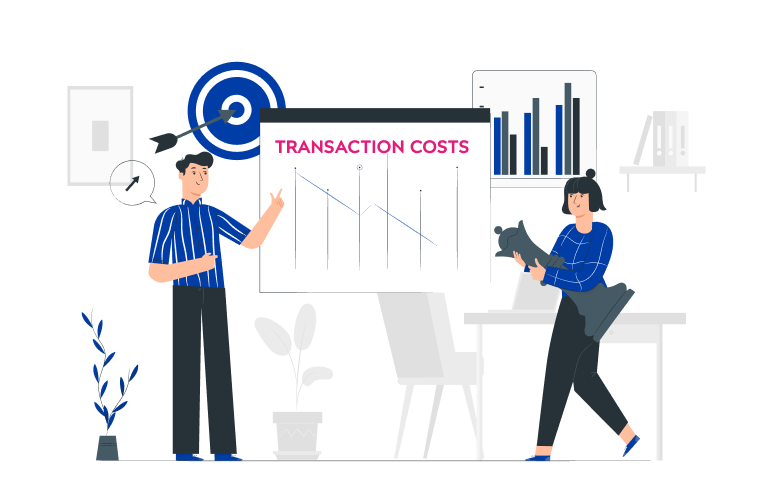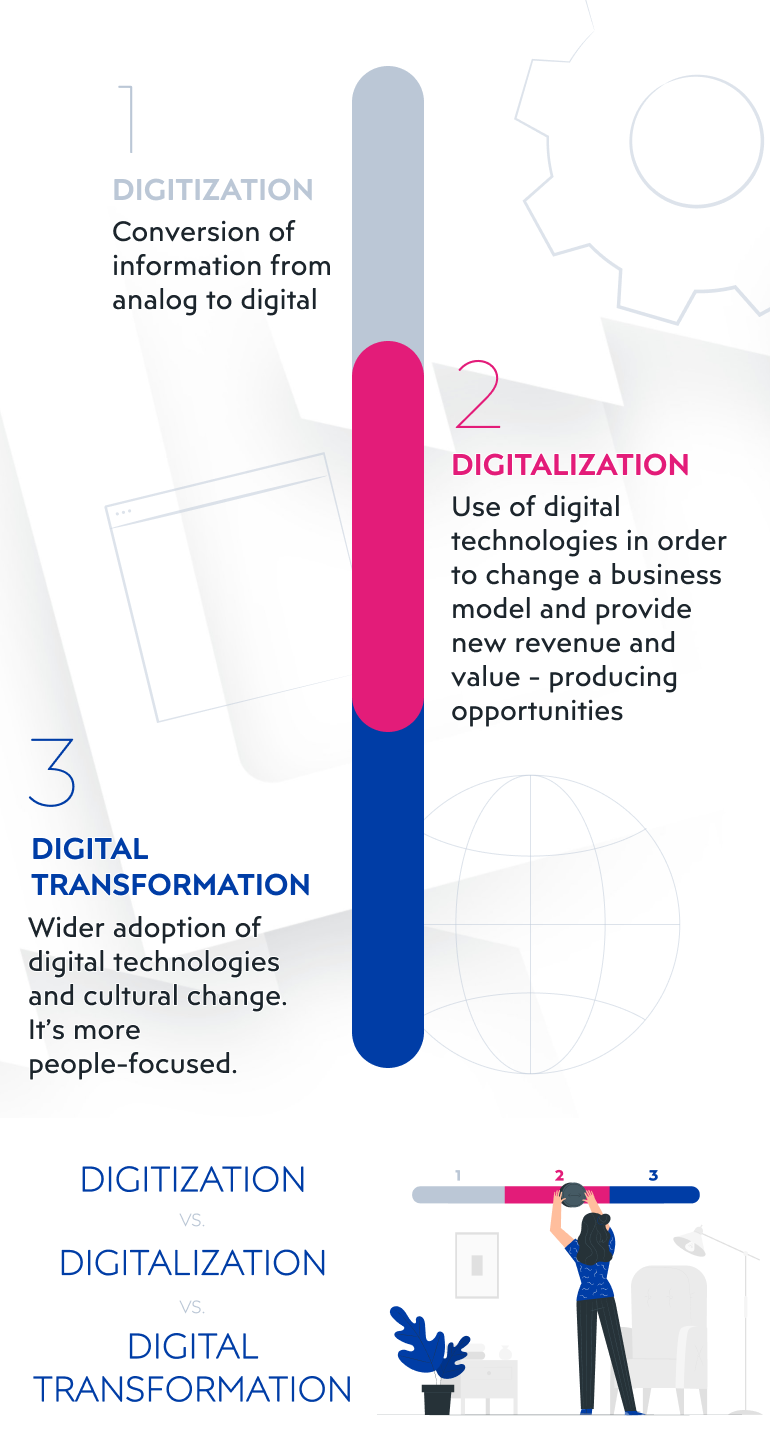What is the role of digitalization in business growth?
Digitalization in business has proven to be almost essential for business success nowadays. It happens when a business starts using digital technologies to change its business model and provide new value-producing opportunities.
It’s often mistaken for digital transformation or digitization, and yet it strongly differs.
In this article, you’ll find out more about what digitalization is and what it’s not. Moreover, we’ll talk about the application of digitalization in your business.
Furthermore, we’d like to point out that if you’re looking to digitalize your company, you don’t need to look any further. We’re a Pimcore development company with experience in digitalizing businesses and more than 8 years of work on our hands.
Whatever you need – we can make.
But, without any further ado, let’s jump right into the topic now, shall we?
What have we prepared for you
What is digitalization?
As stated by Gartner, digitalization refers to using digital technologies to change a business model and provide new revenue and value-producing opportunities.
We can say that it includes every activity and process that’s made possible by digital technologies. Digitalization in business has brought many companies to success.
From automating their marketing activities to processing their orders, businesses have fully leveraged digital technologies.

Digitalization in business helps to improve the efficiency of its operations, making automation possible. There are fewer human errors and operational costs are reduced, due to the decreased need for human resources.
To fully understand digitalization in business, we must understand the role technology plays in the whole process.
Digital technologies have reconfigured the whole business landscape, transitioning from traditional analog to digital. Data isn’t stored anymore on any storage devices but on the cloud, thus ensuring there are no data silos.
Cloud computing helped many companies gain a competitive advantage amongst their competitors. Even we use cloud databases on a daily basis, as they have proven to have an enormous impact on team collaboration and performance.
By using cloud storage, data loss is prevented and data backups are automated.
Digitalization in business has brought countless changes and we’ll go through a few so you get a better grasp on the whole topic of digitalization.
Customer behavior in a digitalized environment
This may be the most significant change caused by digitalization.
Just remember, how did you buy anything 15 years ago? And how are you buying today?
These are two completely different worlds.
To support that claim, GE Capital Retail Bank’s study has found that 81% of consumers go online to conduct research before heading out to the store. Furthermore, there’s a growing trend of buying online, which we’re all aware of.
By fully embracing digital technology, customers are now using the web and mobile apps to find whatever information they might want, whenever they want it.
And now, customers aren’t only comparing your goods and services to your direct competitors, but they are comparing them with different industry’s offerings that may provide even better products and services.
Up to this point, customers are continuously pressuring companies to level up their customer experience to a certain extent, considering the experiences customers have with other companies globally.
Companies are reaching new heights thanks to their customers!

Effects of digitalization on sources of knowledge
Digitalization has blessed us with countless sources of expertise and knowledge available. Every company needs to be aware of the knowledge that lies beyond the traditional boundaries.
Companies should learn how to bring together collaborative groups in such a way that it contributes to both the development and creation of surplus economic value.
It’s essential to know how to establish relationships with external communities, but also how and when to capture value when owning and managing elements of processes.
All in all, digitalization enables a large variety of people to group together, connecting IT and non-IT departments and impacting the way businesses create value.
Digitalization brings lower transaction costs
Nowadays, companies are running low-cost experiments that were unimaginable in the past.
It’s easier to set new goals and test them in a low-risk environment, which gives companies more insight into future directions and if they’re going to be cost-effective.
Startups are excellent examples of companies that fully rely on digital technology. Their future is uncertain and their business models lay foundations on that fact.
To succeed, they need to test and test again. The company’s success today depends on how agile are they.
“In the new world, it’s not the big fish which eats the small fish, it’s the fast fish that eats the slow fish.”
- Klaus Schwab, Founder and Executive Chairman of the World Economic Forum
Now that we’ve covered what digitalization actually is, let’s talk more about the advantages and benefits of digitalizing your business!

Advantages of digitalization in business
We’ve already pointed out that digitalization has brought many novelties in the business landscape.
Now, let’s go through some specific novelties and how they benefit your business. Also, you’ll see how to take advantage of those benefits starting even today:
- Increased efficiency of all operations
- Fewer human errors
- Safer data storage in the cloud
- Reduced operational costs
- Enables data analysis
We already elaborated on how all of this impacts your business, but we can always say a few words more to clarify.
Due to the implementation of digital technologies, workflows are becoming streamlined and there are fewer human errors. All of the operations are executed more efficiently, thanks to these streamlined workflows which enable businesses to reduce operational costs.
As we said, companies tend to store their data in cloud databases, and now that’s a standard. Today, it’s almost impossible to picture a great number of companies not using cloud storage.
Cloud computing giants such as 3M, Microsoft, and Google offer high-security cloud services, enabling careless digital asset management.
As for data analysis, let’s just say – could you even imagine analyzing data without the use of digital technologies?
Of course, you can’t.
Tools such as Google Analytics have become the very core of basic data analysis. Of course, there is a huge number of high-quality data analysis tools available, but to keep it simple, let’s just use Google Analytics as an example for now.
Without digital technologies, we wouldn’t even get close to the level of data analysis we’re at right now. It’s almost unimaginable.
But to move on, let’s discuss some more benefits that digitalization brings to the table.
Increased digital presence
It’s safe to say that this benefit is the most visible one. If a company is present through social networks, online stores, and business directories, its visibility is clearly multiplied.
Many companies only have a digital presence, meaning there’s almost no offline presence whatsoever.
Emerging of new communication channels
The implementation of digital technologies not only increases the company’s digital presence but also sparked the creation of new communication channels.
Emails, mobile applications, and social media are examples of these newly-established (well, not so new to be exact) communication channels. By harnessing the power of digital communication channels, you even have the chance of implementing an omnichannel strategy!

This increases the chance of boosting your sales revenue and customer loyalty, but on the other hand – there are some new responsibilities!
You, as a business owner, should take care of all of these communication channels and, together with your team, develop strategies for using those channels.
Remember, it’s not about quantity, it’s about quality.
You can have 10 poorly designed and automated sales channels and still not see the amount of revenue you were expecting. But let’s say you have 2-3 expertly designed and fully automated sales channels which will bring in more revenue than you could ever imagine.
As we said, more communication and sales channels – more responsibility.
Digitalization encourages innovation
Digitalization in business has a massive impact on innovations. As the technologies become more and more advanced, they simply force you to act and innovate.
And once you start, it’s hard to stop. Continuous innovation is going to allow you to be more aware of new trends and opportunities.
We made clear what digitalization is – now let’s see what digitalization isn’t!
Stay with us, as the next chapter is going to be a mind-opener for many.
Digitalization vs. digitization vs. digital transformation
When you consider digitalization, digitization, and digital transformation to be equal, you’ll quickly find yourself in a pickle.
Even though these terms may be connected to each other, they are certainly different.
Let’s see how they differ.
Digitalization vs. digitization
Simply said, digitalization isn’t possible without digitization.
Digitization refers to the conversion of information from analog to digital formats. On the other hand, digitalization refers to the use of digital technologies and digital data to create new value-producing opportunities and transform the way customers and companies interact with each other.
Digitization is more focused on internal optimization of processes such as work automation and paper minimization while digitalization goes deeply beyond that.
Digitalization vs. digital transformation
Even though digitalization may often be used as an umbrella term for digital transformation, both of these terms greatly differ.
Digital transformation refers to much wider use of digital technologies and cultural change. It’s more about people than it is about digital technologies. It demands core changes in the organization backed by leadership.
It emphasizes empowering employees with digital technologies in order to change the corporate culture.
You can already see what’s the big difference between digitalization and digital transformation.

Why is it important to differentiate these 3 terms?
If you misunderstand these terms, you may be missing out on many opportunities to gain a competitive advantage and become a fully-digital agile business.
Many leaders found themselves in misconception, thinking that they can digitally transform their business by digitizing their data and digitalizing their processes.
These 3 terms greatly differ and you should be aware of this if you’re thinking about serious business growth.
We’ll demonstrate it in a short example.
First, let’s say you’re organizing a 2-month eCommerce education for young entrepreneurs. They all come to your office and they’re required to sign their attendance on a sheet as proof of applying for the education. After that, you collect those sheets and upload them as PDF or spreadsheet documents.
This example refers to digitization, as we have analog data formats converted to digital ones.
Next, let’s say you prepared an app for your students where they can upload their work, mark their attendance and consume educational content. All of the students are required to download the app in order to attend your eCommerce education.
That way, you can easily communicate with your students and evaluate their progress. All of the files they upload are shared with you as an educator, or between all of them. To access the app, they can use their email address.
This example refers to digital transformation, as it affects the whole process, not just a single action – such as converting paper sheets into PDFs.
And lastly, let’s say one of your students decides to leave after some time. To leave the program, they are required to fill out a form on the app which is automatically sent to your HR team. Your HR team processes the form and stores it in the cloud. When their request for leave is approved, both the student and the educator are notified via the app.
This example refers to digitalization. Digital technologies are used extensively and there is less paperwork. Efficiency is improved, but the business model remains the same.
For long, there have been many misconceptions about digitalization and we hope we cleared them in this chapter.
Now, let’s take a look at some examples of implementing digital technologies.
<[book id='10885']>
Examples of successful digitalization
There are numerous examples of successful implementations of digital technologies all around us and yet, we’re not even aware of them.
When you Google “examples of digitalization”, all you’re offered are results such as “digitization examples” and “digital transformation examples”. And you don’t need that at the moment.
So, let’s take a quick look at how some industries leveraged digital technologies in order to level up the efficiency of their processes.
Banking meets digital technology
There’s no need to cite a specific example for this industry. All you need to do is take a look at your phone.
You have a banking app, right? Does it function the same way as it does offline? Absolutely.
The world of online banking has become the most notable example of digitalization. You no longer need to leave the comfort of your home and wait in a never-ending line just to put money into your savings account. Or to pay off the credit card.
Mobile banking apps have become reliable, secure, and fast. They make it even easier to handle your money than by doing it in the actual bank.
To additionally spark your imagination, just imagine a bank with no physical branch. Well, there are many out there to be exact. And they are the ones leading the way and creating a fully automated system of online banking. Ten years ago, not so many people could even imagine this happening.
Let’s see what’s next!
Digitalization in advertising
Although this may not seem as shocking, picture it like this.
Facebook Ads and Google Ads are one of the most used advertising platforms nowadays. Just try to remember how advertising looked before these two advertising platforms came to life.
Today, we’re able to conduct market research thanks to digital technologies and use Facebook Ads and Google Ads to target the specific audience, which wasn’t exactly possible in the golden age of TV commercials.
“Half the money I spend on advertising is wasted, the trouble is I don’t know which half”
- John Wanamaker, merchant, political figure, pioneer in marketing
Would you agree with John Wanamaker?
If you don’t know who he is, he’s an American 19th-century merchant and a political figure.
Now, why does it make more sense to disagree with this quote in the age of digitalization? Because we can measure everything today with the help of digital technology. Tools, such as Google Analytics enable us to analyze every action a user made on a website or a mobile app.
To fully digitalize your business is not optional. It’s necessary. If your business isn’t evolving and embracing digital technologies, you’re falling behind.
You need to adopt new technologies and use them to learn from both your customers and competitors. Only after the successful implementation of digital technologies, you should consider digital transformation as the next logical move. And if you’re a retailer, digital transformation will enable you to implement winning omnichannel strategies.
What’s my next move now?
Now we’re talking!
After realizing that digitalization is a prerequisite for success in the new digital landscape, you may wonder how you can actually digitalize your business.
If you’re a business owner trying to set your company on the right path, we’d be more than happy to help you.
When it comes to digitalization in business, we’ve taken a huge interest in Pimcore – a digital experience platform made to help entrepreneurs such as yourself.
Many businesses today are still built on WordPress, and yet not so many decide to chase after a better WordPress alternative. It’s crucial that you keep up with the newest technologies if you’re looking to succeed in the modern-day market.
We like it so much that we went great lengths to become an expert Pimcore development agency and even Pimcore Silver partner!
So, you’re thinking about what concrete steps you need to take in order to fully digitalize your company – worry not. We’d like to hear more about your ideas and share a few of our thoughts with you.
Free consultation never hurt anybody, right? 🙂
If you’d like to take the next step and avoid falling behind your competitors, you know what to do. Contact us and let’s see how we are going to level up your business!






